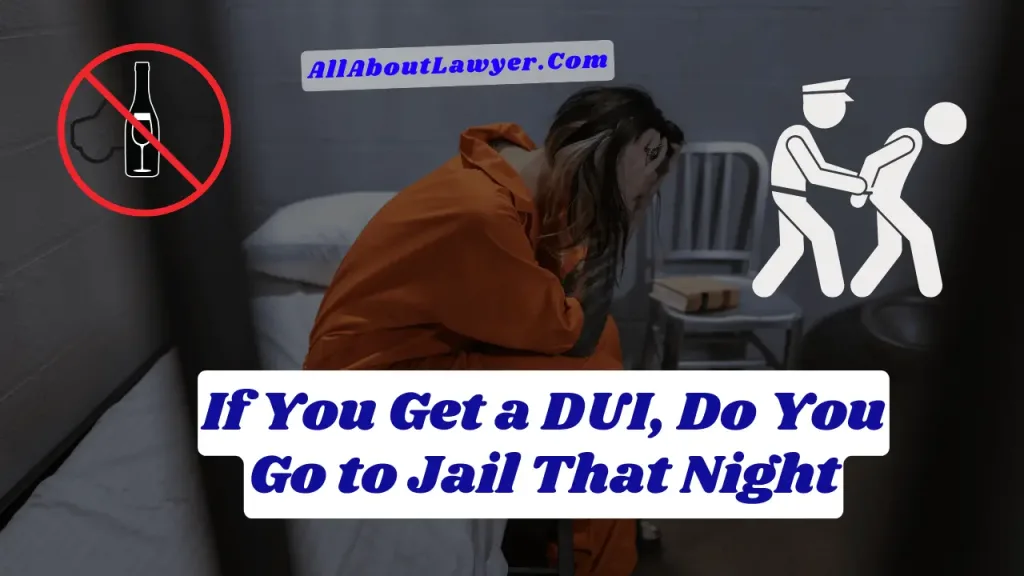If You Get a DUI, Do You Go to Jail That Night?
If you’re arrested for driving under the influence (DUI), one of the first questions that comes to mind is, “Will I go to jail that night?” Knowing what to expect during a DUI arrest can help alleviate some fear and uncertainty. The events that follow a DUI arrest are typically systematic and regulated by law, with specific procedures that officers follow.
This article will walk you through the steps of a DUI arrest, from the initial traffic stop to possible release options, including factors that determine whether you’ll spend the night in jail. Understanding these steps can help you be prepared for what may follow and better understand your rights throughout the process.
Table of Contents
The Traffic Stop: What to Expect
The DUI arrest process begins when a police officer pulls a driver over for suspected impaired driving.
Initial Contact
- Observing Driving Behavior: The officer may notice erratic driving, speeding, or other behavior signaling potential impairment.
- License and Registration Request: Upon approach, the officer requests the driver’s license and registration.
- Noting Signs of Impairment: The officer will observe for signs of alcohol or drug impairment, such as slurred speech or bloodshot eyes, and may begin documenting these observations.
Field Sobriety Tests
Standardized field sobriety tests may be conducted to assess coordination and focus.
- Tests Administered: The officer may ask you to perform a series of tests, such as walking in a straight line or standing on one leg.
- Documentation of Performance: The officer notes any signs of impairment.
- Voluntary in Most States: Participation in field sobriety tests is voluntary in many states, though refusal could still lead to arrest based on other observations.
Chemical Testing
Preliminary Breath Test (PBT)
The preliminary breath test (PBT) is a roadside breathalyzer test used to detect blood alcohol concentration (BAC).
- Establishes Probable Cause: The PBT helps officers determine whether an arrest is necessary, though it’s not admissible in all courts.
- Refusal Consequences: Refusing the PBT may lead to further investigation or an immediate arrest, depending on state laws.
Official BAC Testing
If arrested, the driver may undergo official BAC testing, such as a chemical breath test or blood test.
- Chemical Breath Test at the Station: This breath test provides a formal BAC reading.
- Blood Test Option: In some cases, a blood test may be required to confirm BAC, especially if the breath test is refused.
- Refusal Penalties: Refusing official testing can lead to license suspension and other penalties.

Arrest and Booking Procedures
Following the traffic stop and testing, the arrest process begins if the officer determines there is enough evidence of DUI.
Initial Detention and Arrest Process
- Miranda Rights: The officer reads the driver their rights, explaining the right to remain silent and the right to an attorney.
- Personal Belongings Collection: Any personal items, such as phones or keys, are collected and stored.
- Vehicle Towing: The vehicle is typically towed, and the driver is transported to a detention facility for booking.
Booking Steps
- Fingerprinting and Mugshot: Officers take fingerprints and a mugshot to document the arrest.
- Personal Information Collection: The driver’s information is recorded, including contact and background details.
- Medical Screening and Initial Assessment: Screening ensures there are no immediate health concerns, and the detainee is assigned to a holding cell.
Factors Affecting Length of Initial Detention
The time spent in detention varies based on several factors, which influence whether the individual will stay overnight.
Key Factors Influencing Detention Duration
- BAC Level: Higher BAC levels may result in longer holds to ensure the individual is sober.
- Local Jurisdiction Policies: Some regions require a minimum hold for DUI offenders.
- Facility Capacity: Busy facilities may delay processing, affecting release times.
- Release Options Availability: Same-night release may depend on bail options or other release conditions.
- Prior Record and Cooperation: First-time offenders with a cooperative demeanor may experience faster processing.
Also Read: How Many Years in Jail for Drunk Driving and Killing Someone?
Release Options: Can You Avoid Overnight Jail?
Same-Night Release Possibilities
Citation Release
- Conditions: Commonly available for first-time offenses, citation release is often granted to local residents who are cooperative and have no aggravating factors.
Bail Options
- Bail Types: Options include cash bail, bail bonds, or release on one’s own recognizance (ROR) in cases where the individual poses minimal risk.
- Electronic Monitoring: In some areas, offenders may be released under electronic monitoring, especially if they are first-time offenders with strong local ties.
Factors Affecting Release Decisions
- Positive Factors: First offense, local ties, steady employment, cooperative behavior, and lower BAC.
- Negative Factors: Prior DUIs, high BAC, accident involvement, lack of ID, and uncooperative behavior during booking.
Immediate and Short-Term Post-Release Requirements
Once released, DUI offenders must comply with a set of immediate requirements and begin preparations for legal proceedings.
Immediate Requirements
- Documentation: Upon release, you’ll receive a temporary license, court date notice, and any conditions of release.
- Next Steps: This includes retrieving your vehicle, consulting a DUI attorney, and scheduling a DMV hearing if applicable.
Short-Term Obligations
- Administrative: These include setting up DMV hearings to contest license suspension, verifying license status, and notifying your insurance provider.
- Legal Considerations: Consult with an attorney, gather evidence, and identify any potential witnesses.

State-by-State Variations in DUI Holding and Release Policies
Laws and policies vary by state, which influences the likelihood of overnight detention.
Mandatory Hold States
Some states require mandatory holding periods for individuals with high BAC levels or those showing severe impairment.
- Arizona: Holds for 12 hours if BAC exceeds 0.15%.
- California: Holds until the individual is sober.
- Florida: Imposes an 8-hour minimum hold.
- Texas: Holds individuals until they can appear before a magistrate.
Release Policies by Region
Zero Tolerance States
Zero tolerance states impose stricter release policies:
- Mandatory Holds and Court Appearance: Offenders may face higher bail, required court appearances, and stricter conditions for release.
Flexible Policy States
Other states offer expedited release options:
- Citation Releases and Lower Bail: These states may have more flexible bail policies, lower requirements, and more release options for first-time offenders.
Conclusion
Whether or not you spend the night in jail after a DUI arrest depends on various factors, including your BAC level, the presence of aggravating circumstances, and state-specific laws. While many first-time offenders may be released after a few hours, those with higher risk factors or repeat offenses often face mandatory overnight stays. If you’re facing a DUI arrest, remain calm, know your rights, and consult with legal counsel as soon as possible to navigate the next steps effectively.
Next Steps
- Consult with a DUI Attorney: Contact a lawyer to discuss your case and potential defenses.
- Understand Local DUI Laws: Learn about your state’s DUI policies, including minimum holding times and alternative sentencing.
- Prepare for Upcoming Court Dates: Work with your attorney to plan your court appearance and any required DUI classes or programs.
Remember, the best way to avoid these situations is through prevention—never drink and drive.
Common Questions About DUI Arrests and Overnight Jail Time
Will I definitely spend the night in jail after a DUI arrest?
Not necessarily. Many jurisdictions allow citation release or bail options, especially for cooperative, first-time offenders.
How long is the typical holding period for a DUI?
Holding periods vary by state and individual circumstances, ranging from immediate release to 24 hours, with mandatory holds in some states.
Can someone bail me out the same night?
Yes, in most areas, bail is available after booking and BAC documentation. However, certain states enforce mandatory holds before release.
What factors determine if I’ll be released the same night?
Factors include BAC level, cooperation, prior record, and local policies, as well as accident involvement or the availability of a responsible person for release.
Will I lose my license immediately?
Most states issue a temporary license valid for 30 days. During this period, you may request a DMV hearing to contest the suspension.
About the Author

Sarah Klein, JD, is a former criminal defense attorney with hands-on experience in cases involving DUIs, petty theft, assault, and false accusations. Through All About Lawyer, she now helps readers understand their legal rights, the criminal justice process, and how to protect themselves when facing charges.
Read more about Sarah
